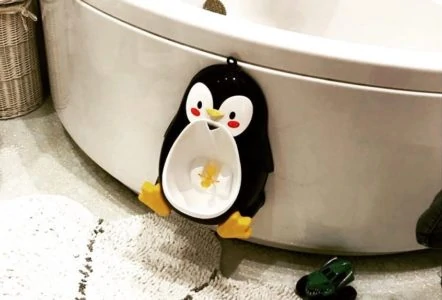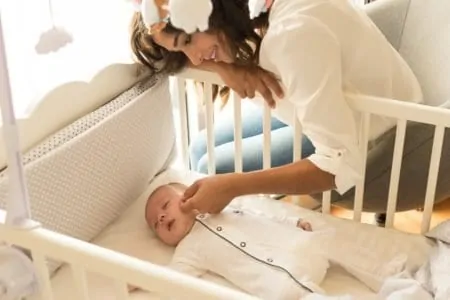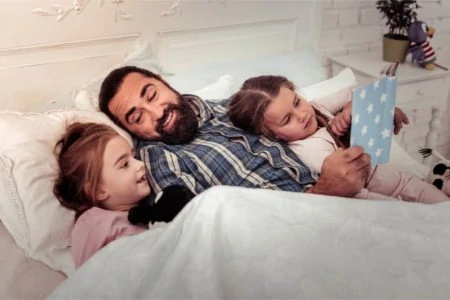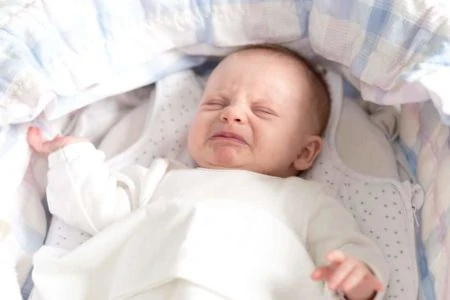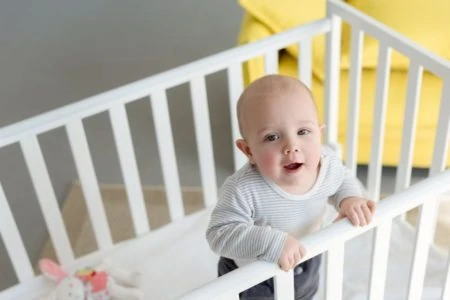Is your toddler practicing their escape artist skills? Watching your little one transition from a crib to a big kid bed is a major milestone, but it often comes with a mix of pride and panic.
Don’t worry. While the graduation day can feel daunting, it doesn’t have to be a nightmare.
We have been through this transition with our own children, so we understand the hesitation. In this guide, we will walk you through the signs of readiness, common challenges, and expert tips to make the switch as smooth as possible. We also reviewed three fantastic books that can help get your toddler excited about the change.
Key Takeaways
- Timing is key: Most children transition between 18 months and 3 years old, or sooner if they start climbing out of the crib.
- Patience wins: Avoid rushing the process; a slow, steady introduction reduces anxiety for everyone.
- Routine matters: Keep the bedtime routine and room decor consistent to provide a sense of security.
- Use stories: Reading books like “Your Own Big Bed” helps toddlers visualize the change and accept it faster.
When Should You Transition?
Your child relies on routine and naturally resists change. Knowing the right time to introduce a new bed is the secret sauce to succeeding in this adventure. Bringing it up too soon could spook your toddler, but waiting too long can be a safety hazard if they are starting to escape their crib.
If you have adjusted the crib mattress to the lowest setting and your toddler is still attempting a jailbreak, it is time to make the switch.
Most experts recommend transitioning between 18 months and 3 years old (1). However, if your child isn’t climbing out, many sleep consultants suggest keeping them in the crib as close to age 3 as possible to preserve good sleep habits.
Rely On Instincts
Why Children Fight the Big Bed
Understanding your toddler’s perspective makes the resistance easier to handle. While an open bed seems like freedom to us, it can feel like a loss of security to a child.
Growing up is intimidating. We unintentionally put pressure on our kids to mature quickly, and some children cling to their cribs to ground themselves.
Think of the crib like a security blanket or that one stuffed animal you aren’t allowed to wash. It is their safe space. It is all they have ever known. Suddenly taking those four walls away can be confusing and scary for a little one.
How Fast Should You Transition?
It is tempting to rush the process, especially if you have another baby on the way or your toddler is escaping the crib. Unfortunately, rushing is one of the biggest mistakes you can make.
Dial it back. Take your time. Stress and exhaustion make it harder to handle their resistance, but losing your temper will only cause setbacks.
Children sense when something is forced. Your frustration won’t settle their behavior any faster. Instead, keep the vibe positive and relaxed. The more your child sees this new adventure as safe and normal, the quicker they will adjust. This might mean sitting by their new bed for a week or two until they feel secure.
Be Patient
3 Problems Kids Face When Transitioning
Not every toddler will have a meltdown when it is time to sleep in the new bed, but you might encounter a few bumps in the road.
1. The Hard “No”
You might be greeted with a firm refusal every time you bring up the new bed.
Toddlers who push back immediately usually need more time to process the idea. This is their way of rejecting change, often due to fear or a lack of understanding. If they dig their heels in, back off slightly. Continue talking about the change and reading books about it without forcing the issue immediately.
2. The Jack-in-the-Box
Sometimes you get your child safely into bed, only to find them standing next to you five minutes later. Or in the middle of the night. Or twenty times a night.
Some toddlers view the lack of rails as a quest to conquer rather than a place to sleep. They might like the bed but won’t stay in it. This usually stems from curiosity or a lack of boundaries. Since the physical barrier is gone, you have to work harder to establish the verbal boundary that “bedtime means staying in bed.”
This is the most common scenario I hear from parents during the transitioning process. Toddlers often aren’t used to the idea of a different bed or have fears of some sort, so they end up in their parents’ room or bed during the night. If the parent wakes, I recommend putting the child back into the toddler bed. Of course, this is only possible if the parent wakes and does not sleep through the intrusion.
Editor's Note:
Dr. Leah Alexander, MD, FAAP3. Night Wakings
Your toddler’s anxiety about the new setup could affect their ability to self-soothe (2). Waking up in a strange, open environment can be startling.
This often leads to them coming into your room at 2 a.m. We know this is the last thing a tired parent wants, but try to remain calm. quietly walk them back to their bed with minimal interaction. This phase won’t last forever.
4. Regressions After Travel
Even if the initial transition went smoothly, we often see regressions after a move, a vacation, or a sickness.
Being in a new environment or sleeping in a hotel can unsettle toddlers, making them feel insecure in their own bed when they return. It may take several weeks of re-training and encouragement to get back to your normal routine.
5 Expert Transitioning Tips
You know the *when* and the *why*. Now let’s talk about the *how*.
Every family is different, but these strategies have helped us and countless other parents coax toddlers into their new beds with minimal tears.
1. Keep the Room Familiar
Toddlers are creatures of habit. When you change the bed, keep everything else exactly the same.
Place the new toddler bed in the same spot the crib occupied. Don’t paint the room or move the dresser yet. Ensure their favorite stuffed animals are waiting for them. Familiarity breeds comfort.
2. One Change at a Time
If you are ditching the crib, do not start potty training the same week. Overloading your little one with too many developmental leaps will make everyone miserable.
Keep life calm and predictable during the switch. If you are exhausted, trade off shifts with your partner so you can maintain your patience.
3. Offer Controlled Choices
Give your toddler a sense of ownership. If they aren’t in immediate danger of climbing out, let them dictate the pace.
Let your child pick out the new sheets or pillowcases. If they love dinosaurs, get dinosaur sheets. Making the bed “theirs” increases the desire to sleep in it.
4. Start with Naptime
If your toddler is particularly resistant, try a “naptime only” trial run. Tell them, “You can nap in your big boy bed, but you can sleep in the crib tonight.”
This lowers the stakes. You can also start the bedtime routine in the new bed, stories and cuddles, before moving them to the crib for actual sleep. Exposure is key.
5. Use the Power of Books
Almost every toddler loves storytime. This was our number one method for success.
Read books about characters who move to big beds. It normalizes the experience and gives them a script for what is happening. You can even use reading as a reward: “I will read one more book if you lay in your big bed quietly.”
3 Books About Big Kid Beds
Stories are powerful tools. Here are three books we reviewed that help toddlers visualize the process and get excited about their new sleeping arrangements.
1. Your Own Big Bed by Rita Bergstein

This book is fantastic for children who need a gentle, calming approach. The text is soothing, and the cool-toned illustrations present the transition as a natural, relaxed event. It validates the confusion a child might feel while helping them find peace with their new environment. It is a great choice for bedtime reading right before lights out.
2. Big Enough For a Bed by Sesame Street

If your child loves Elmo, this is a must-buy. Seeing a beloved character go through the same experience makes it seem less scary. Elmo makes the journey to a big kid bed in a simple, positive way. It is short enough to hold a toddler’s attention and frames the change as an achievement rather than a loss.
3. Big Bed For Giraffe by Michael Dahl

This is a durable board book, making it perfect for toddlers who might be a little rough with paper pages. The story is upbeat and follows a growing giraffe who needs more space. It helps children understand the *reason* for the change (growing bigger) and helps them realize they are not alone in the process.
Escaping the Bed
If you have a child who keeps escaping the bed, remember that this is a phase. Do your best to make the room boring so there is no incentive to get up.
If your child is throwing massive tantrums and refusing to stay put, they might not be ready. If safety allows, step back and try again in a few weeks.
We also love the book The Girl Who Got Out of Bed for this specific struggle. It teaches kids the importance of staying in bed to get to dreamland faster.


